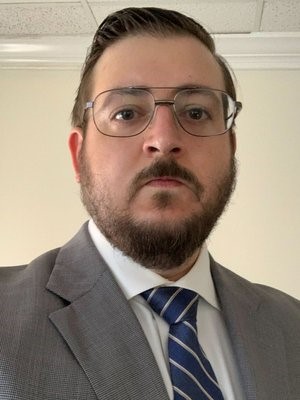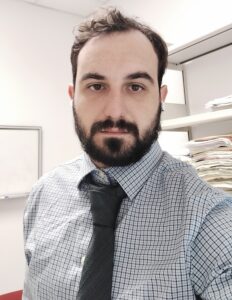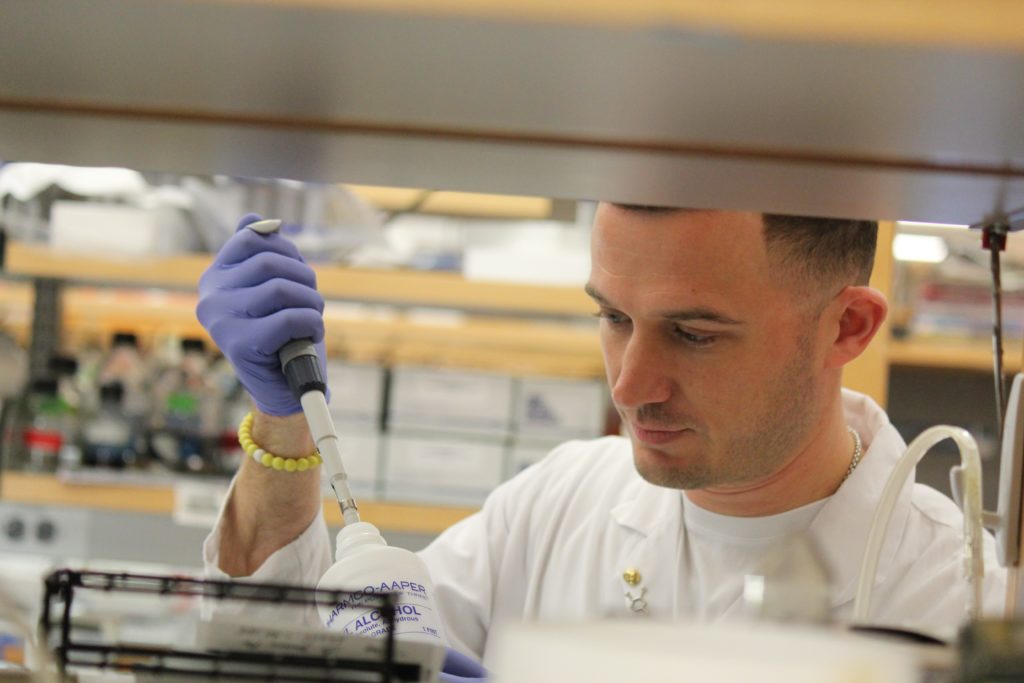Main Content
Current Trainees

Wesley Evans
Dr. Wesley Evans earned his Ph.D. in Neuroscience at Tulane University in 2022. His thesis focused on investigating the effects of recurrent hypoglycemia on the cerebral vasculature and how those effects may lead to worsened damage from ischemic stroke under the mentorship of Drs. Prasad V.G. Katakam and Ricardo Mostany. He is currently a postdoc in the laboratory of Dr. Rafiq Huda where he is using in vivo imaging techniques to study the role of striatal astrocytes in the genesis of substance use disorders. He is particularly interested in how striatal astrocytic calcium signaling may mediate the motor effects of alcohol exposure and how they may shape and affect the local neuronal circuitry.

Dr. Lazer Gerlikhman
Dr. Lazer Gerlikhman received his M.D. from Jagiellonian University (Kraków, Poland) in 2021. In medical school, his focus was on studying internal medicine, surgery, toxicology, gastroenterology, pediatrics, neurology, and other subjects. He joins Dr. Dipak Sarkar’s lab at the Endocrinology Research Building where he will use bioinformatics techniques to study the relationship of alcohol exposure, Alzheimer’s disease, and neuroinflammation. He is particularly interested in the epigenetic transformation of the human genome with regards to tumor development.

Dr. Holly Poore
Dr. Holly Poore earned her Ph.D. in Clinical Psychology from Emory University in 2021. In graduate school, her work focused on the development, hierarchical structure, and etiology of externalizing disorders (e.g., ADHD, alcohol use and misuse, conduct problems) and related traits (e.g., personality, aggression). She joins Dr. Danielle Dick’s lab at the Rutgers Addiction Research Center, where she will use multivariate statistical genetic techniques to study the genetic architecture of substance use disorders and related psychiatric conditions. She is particularly interested in the degree to which substance use disorders share genetic influences with other externalizing and internalizing psychiatric conditions and how these genetic influences operate throughout development.
Past Trainees

Dr. Chuhyon Corwin
Dr. Chuhyon Corwin earned her Ph.D. in neuroscience from The Graduate Center, City University of New York (CUNY), where she studied chronic neuroinflammation in neurodegeneration under the guidance of her mentors, Dr. Figueiredo-Pereira at CUNY and Dr. John Babich at Weill Cornell Medical College. She joined Dr. Gary Aston-Jones’s lab as a postdoctoral fellow at the Rutgers University Brain Health Institute for the research of the brain circuits implicated in addictive disorders, which can also provide insights into the mechanism of neurodegeneration in response to toxins and in the neuroinflammation process. Her research focuses on the effect of modulation of the locus coeruleus and its associated arousal system, as it may be highly relevant to the treatment of addictive disorders.

Dr. Ian Frazier
Dr. Ian Frazier obtained his Ph.D. in Behavioral Cognitive Neuroscience and Developmental Psychology from the University of Florida. During this time, his research focused on age-related changes in social decision making, specifically in decisions to trust others. With Dr. Natalie Ebner and Dr. Sara Jo Nixon as his mentors, Ian utilized various methodologies including neuroimaging (fMRI and EEG), acute oxytocin administration, and neuroeconomics. His present goal is to use those skills under the mentorship of Dr. Marsha Bates and Dr. Jennifer Buckman to research how resonance breathing interventions may aid in goal-directed decision making in individuals engaged in problematic drinking behavior.

Dr. Julianne Price
Dr. Julianne Price joins us from the University of Florida where she received her degree in Behavioral and Cognitive Neuroscience under the mentorship of Dr. Sara Jo Nixon. Her work has focused on the interplay between neuroregulatory systems including neurocognitive functioning and the hypothalamic-pituitary-adrenal (HPA) axis in treatment-seekers with alcohol and substance use disorders (SUDs). She has a particular interest in factors contributing to individual differences, such as sex and race. She joins Drs. Marsha Bates and Jen Buckman at the Center of Alcohol & Substance Use Studies, where she will integrate her research interests with new training in how cardiac signaling and the baroreflex mechanism participate in high-risk college drinking patterns and relapse risk in women receiving treatment for an SUD.

Dr. Matthew Scarnati
WEBSITE: Pang Lab
The broad focus of my work involves the utilization of patient derived stem cells to understand how common gene variants in the population contribute to addiction. The primary objective of my work in the Pang lab is to employ the induced neuronal cell (iN) technology to generate human neurons carrying allelic variants in the μ-opioid receptor (MOR) to probe the interaction between alcohol and opioid signaling. Elucidation of how this gene variant affects alcohol sensitivity in a human neuronal context will provide novel mechanistic information about the involvement of opioid signaling in alcohol use disorders (AUDs). My future work is going to focus on how alcohol can increase the risk for individuals to develop dementia.
